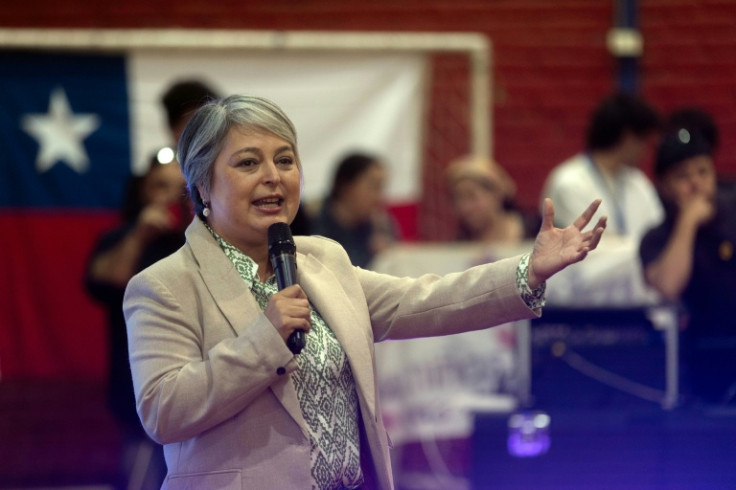Chilean Candidate Downplays Communist Roots In Quest For Presidency

Chilean left-wing presidential candidate Jeannette Jara is a card-carrying communist, but you won't see the hammer and sickle at her campaign events.
The woman seen as having the best chance of preventing the far-right from taking power in the November elections has lurched towards the center in her bid to woo voters.
Jara, a former labor minister under outgoing President Gabriel Boric, swept a primary of Boric's left-wing coalition in June to set up a likely November 16 showdown against the far-right's Jose Antonio Kast.
Polls show Jara and Kast -- who is on his third presidential campaign focused on closing Chile's borders to migrants -- alternatively leading the race.
Conservative candidate Evelyn Matthei trails in third place in most polls.
Jara faces an uphill battle to overcome the fear of communism which has permeated Chilean society since the 1970s when Socialist president Salvador Allende was toppled by US-backed generals vowing to stop Chile becoming Communist.
With widespread concerns over a perceived rise in violent crime, the pendulum in Chile has swung further right after 3.5 years of leftist rule, forcing 51-year-old Jara, a Communist Party member since the age of 14, towards the center.
"I am not the Communist Party's candidate, I'm the candidate of the center left," she said recently.
At a rally a few days ago in Rancagua, a mining city in the center of the country, her supporters waved Chilean national flags rather than the Communist Party standard or other political party insignia.
Addressing the crowd of around 1,000 people packed into a gym, Jara, clad in jeans and a jacket, stressed the need for "all opinions" to build a "common project."
Estefany Lopez, a 33-year-old social worker, said that Jara is able to unite many voters.
"She manages to transcend what her ideology represents," Lopez told AFP at the rally.
On subjects ranging from tax-and-spend policies to Chile's international alliances, Jara has defied Communist Party orthodoxy in recent weeks.
She has criticized the left-wing authoritarian Venezuelan president Nicolas Maduro and rights abuses in Cuba.
She has also defended fiscal prudence in one of Latin America's most open economies, where the pension system and most public services such as electricity and drinking water are in private hands.
"Don't worry, nothing will be expropriated during my administration," she told major business leaders gathered at a forum in July.
For 53-year-old teacher Esmeralda Ojeda, a lingering fear of communism among a large part of Chilean society could undermine Jara's campaign.
But "we have to look at the person, not the ideology," she told AFP.
The eldest of five children, born to a mechanic and a housewife, Jara had to work from a young age to help pay her own way.
She studied public administration and law, and became known for her negotiating skills and ability to compromise as a student representative and later as a union leader.
Much later, as Boric's labor minister, she put her bargaining skills to the test, working with the right-wing opposition to push through long-awaited pension reforms and a shorter 40-hour work week.
"You shouldn't fall in love with your own ideas," is her mantra.
But not everyone believes she is 'communist lite.'
"I'm terrified that if Jara wins, Chile will become like Cuba or Venezuela," Astrid Hernandez, a 78-year-old retiree, said in downtown Santiago.
"It's very difficult for a person who was trained (since) the age of 14... in a party that is absolutely dogmatic, pyramidal, and structured to say: 'I've changed my ways'," Juan Sutil, former leader of a major Chilean business association, told local radio.
© Copyright AFP {{Year}}. All rights reserved.





















